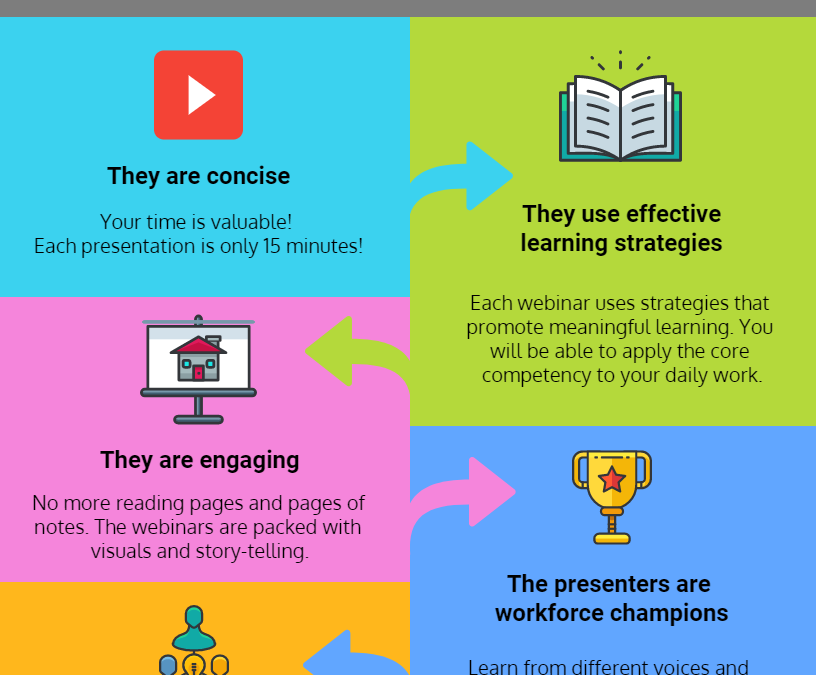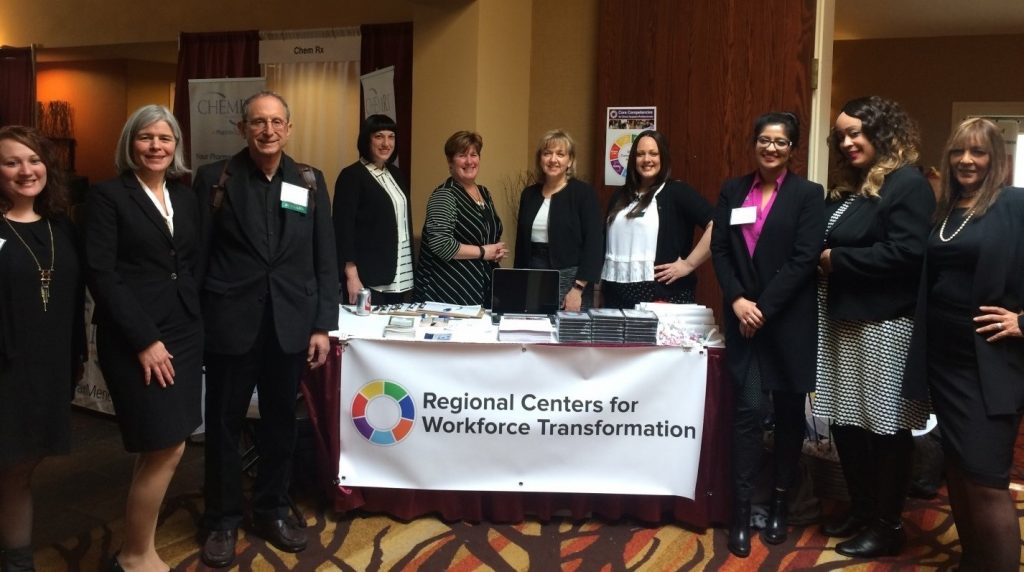
Register Now for the From Compliance to Competency Webinars on the NYS DSP Core Competencies



This series of 10 live webinars will focus on The National Alliance for Direct Support Professionals (NADSP) Code of Ethics. Each webinar will highlight a tenet of the Code.
The webinars are free and sponsored by the Regional Centers for Workforce Transformation (RCWT).
Register below or at https://nadsp.org/events. Recordings of webinars will be available on the RCWT Website.Webinar #1: The History of the Code of Ethics & Using the Preamble
When: THIS FRIDAY, June 30, 2017, at 2 p.m.
Presenter: Joseph M. Macbeth, Executive Director, and John Raffaele, Director of Educational Services, at NADSP
This first webinar in the series will investigate the origins of the NADSP’s Code of Ethics, the hidden “pearls of wisdom” that are found within its Preamble, and help you understand why the Code of Ethics has become the pillar of values for the direct support practice. Joe Macbeth and John Raffaele have provided hundreds of Code of Ethics trainings and this opening webinar will provide the groundwork for the ensuing nine sessions that will dig deeply into each of the ethical tenets.
Register here for Webinar #1. Webinar #2: Code of Ethics Tenet- Person-Centered Supports
When: July 14, 2017, at 2 p.m.
Presenter: Melody Johnson, NADSP Faculty
As a Direct Support Professional, Melody’s first allegiance is to the people she supports. All other activities and functions flow from that allegiance. This happens to be the first tenet of the NADSP Code of Ethics. She has lived this as a family member, Direct Support Professional, and now as a trainer and advocate with and for Direct Support Professionals. Join Melody for this webinar that will explore what it truly means to be person-centered and the challenges inherent in this process.
Register here for Webinar #2. Webinar #3: Code of Ethics Tenet- Promoting Physical and Emotional Well-Being
When: August 11, 2017, at 2 p.m.
Presenters: Tom McClusky, NADSP Faculty
Tom was one of the people who, in 1999 when the first draft of the NADSP Code of Ethics was being written, advocated that Promoting Physical and Emotional Well-Being needed to be a component of the Code. This webinar will show the importance of balancing informed decisions with ensuring the people we support are safe and protected from gross physical, personal and/or emotional harm. This is an ongoing balance act for direct support professionals around the country.
Register here for Webinar #3.Webinar #4: Code of Ethics Tenet- Integrity & Responsibility
When: September 15, 2017 at 2 p.m.
Presenters: Maren Gibson, NADSP Faculty
What is a direct support professional to do when faced with a choice between acting with integrity versus acting with self-interest, deceit or worse? The answer is ALWAYS the direct support professional will act with integrity and responsibility. This can sometimes be tricky but Maren will lend some help in this webinar that will focus on our obligation to always do the right thing according to laws, policies and the best interest of the people we support.
Register here for Webinar #4.Webinar #5: Code of Ethics Tenet: Confidentiality
When: October 13, 2017, at 2 p.m.
Presenters: Don Traynor, NADSP Faculty
HIPAA. Discretion. Privacy. Confidentiality. Secrets. Intimate details about people’s lives. A direct support professional has an amazingly personal relationship with those whom they support. That said, there is also the importance of working with other team members, family members, physicians, community members and so forth. Don will guide webinar participants in the maze of the aspects of confidentiality and offer some tips on how to best keep matters as private as possible between direct support professionals and people they support.
Register here for Webinar #5.Webinar #6 – Code of Ethics Tenet: Justice, Fairness, & Equity
When: November 10, 2017 at 2 p.m.
Presenters: Kathy Brown, NADSP Faculty
Kathy Brown has extensive knowledge and experience in working to ensure that people with disabilities have the same rights and responsibilities as every other citizen in the United States. Although this may sound like a “given”, often times there is discrimination, unfairness and hostility towards people with disabilities. Justice, Fairness and Equity is a tenet of the Code that guides direct support staff to partner with those they support to ensure these aspects of community life.
Register here for Webinar #6.Webinar #7 – Code of Ethics Tenet: Respect
When: December 8, 2017 at 2 p.m.
Presenter: Scott Bradshaw, NADSP Faculty
Description: Every human being is unique. Every human being has value. When it comes to the idea and concept of “respect” it can be a long road towards such acceptance if one has a disability. Direct support professionals are integral in creating opportunities and initiating/facilitating respect with and for the people they support. Scott will outline ways that “respect” is more than a word. Respect is a characteristic of a life of value and distinction.
Register here for Webinar #7.Webinar #8 – Code of Ethics Tenet: Relationships
When: January 12, 2018 at 2 p.m.
Presenter: Chumie Twerski, NADSP Faculty
Description: Chumie has become the NADSP “resident authority” on the value of promoting relationships with and for people with disabilities. Families, friends, lovers, acquaintances and all levels of relationships in between are at the core of this webinar. It is important that we see beyond the relationship between direct support professional and person supported; we MUST go farther to help the people we support establish non-paid and meaningful relationships as we spread inclusion and integration with and for people with disabilities.
Register here for Webinar #8.Webinar #9 – Code of Ethics Tenet: Self-Determination
When: February 9, 2018 at 2 p.m.
Presenter: Jen Teich, NADSP Faculty
Description: Join Jen and explore what self-determination means. It is phrase we hear very often in the world of supporting people with developmental and physical disabilities. However, too often it is not used in the true meaning that the Code is meant to realize. Direct support professionals have an obligation to assist people in helping them direct the course of their own lives. This is a challenging aspect of the job. Informed decision making is a big part of this process. This webinar will explore this.
Register here for Webinar #9.Webinar #10 – Code of Ethics Tenet: Advocacy
When: March 9, 2018 at 2 p.m.
Presenters: Tish Comstock, Advocate, and John Raffaele, Director of Educational Services at NADSP
Description: “With”…not “for”!! As a direct support professional I will advocate WITH the people I support for justice, inclusion and fun community participation. Tish has been a leader in the self-advocacy movement in NY State and around the country for many years. Together, WITH, John they will share some stories and personal experiences on the challenges and successes involved in advocacy. Partnership between the people we support and the role of oneself as a direct support professional is vital in understanding the concept of advocacy when it comes to the NADSP Code of Ethics.
Register here for Webinar #10.
Region 4 of the Regional Centers for Workforce Transformation (RCWT) is hosting a Frontline Supervisor Symposium on Thursday, 5/25/17. The symposium will take place in New York City from 10am-12pm. You can register here.
At a Region 4 meeting in March, several workforce champions agreed that more needed to be done to support frontline supervisors (FLSs). FLSs are responsible for evaluating and observing direct support professionals (DSPs). It is also up to FLSs to create a culture of communication and professional growth. In addition, a FLS should serve as a model for a DSP. FLSs need more guidance and support with this.
At the Region 4 meeting, many workforce champions gave suggestions on how to help FLSs. Here are a few of the suggestions:
– Use a mentorship model
– Do more to acknowledge FLS
– Provide short, mini trainings that can be viewed on the go (e.g. phone)
– Engage in team-building exercises
– Train FLS on their own set of competencies
At the symposium, we will discuss more ideas and come up with a plan of action to support FLSs. FLSs play a major role in workforce transformation because they communicate directly with DSPs. Therefore, we need to take the FLS perspective into account. We also need to pay attention to the FLS and DSP relationship. At the symposium we will talk about why workforce transformation is important and why you should care about it. We will also share time management strategies for FLSs, discuss the core competencies being developed for FLS, and talk about the role of DSPs and FLSs.
At the symposium, Dianne Henk, the Director of Workforce Transformation at OPWDD will be presenting. Sonja Williams-Richardson, who is lead for Region 4, will facilitate.
If you find that the issues mentioned here are relevant to your Region, please contact your Regional Lead and we can plan a symposium in your Region.
In April 2017, the American Network of Community Options and Resources (ANCOR) published a report on the Direct Support Professional (DSP) workforce crisis. The report is called Addressing the Disability Services Workforce Crisis of the 21st Century.
The report talks about a major issue in the field of intellectual and developmental disabilities. There is a lot of turnover for DSPs, meaning that many DSPs leave their jobs. This leaves a lot of vacancies. It also really difficult to recruit people to work as a DSP.
ANCOR says that these issues are a “public health crisis.” If we do not have enough qualified staff, then we cannot provide quality support to people with disabilities.
ANCOR mentions many reasons for why DSPs leave their jobs and why it is difficult to hire more DSPs. Some of these reasons are:
ANCOR notes that society knows very little about the work of DSPs. DSPs are often invisible. Therefore, we need to raise awareness. ANCOR suggests we create video campaigns to educate the public, promote DSP Recognition Week, and give awards to outstanding DSPs. We should also spread more information about DSP wages and turnover rates. Lastly, ANCOR says that DSPs should build trust and support for their work by demonstrating the core competencies.
The DSP workforce is made up of mostly working-age women. There are not enough working-age women to meet the demands of the job market. Therefore, we need to expand the workforce to include men, youth, older workers, etc. We should also invest more in natural and community supports. ANCOR also suggests providing people with educational incentives, such as tuition, college credits, student loan forgiveness, certifications, and diplomas. This will help to attract, train, and retain qualified DSPs.
According to ANCOR, DSPs also leave their jobs because there is little room for growth. There should be more opportunities for professional growth and income raises. Another major concern is technology. Administrators should incorporate more technology to help DSPs with completing paperwork, scheduling shifts, and providing support. Technology can help reduce some of the physical burden that DSPs experience. More funding and training are needed to better incorporate technology.
The intellectual and developmental disabilities field has already taken many steps to help lessen the DSP workforce crisis. Recently, New York State Governor Cuomo committed $55 million dollars to increase wages for DSPs. This addresses the low wage issue. Also, New York State is participating in a national survey that will collect data on DSP wages, vacancies, and turnover rates. In addition, the Regional Centers for Workforce Transformation has 7 regional leads who provide education across the state on the core competencies and other initiatives. The New York State Association of Community and Residential Agencies (NYSACRA) has designed a credentialing program called GEAR UP. In the GEAR UP model, DSPs are given increased wages every time they achieve a milestone or pass an assessment. The Training Collaborative for Innovative Leadership also has their own credentialing program to develop the skills of frontline supervisors.

There is a national crisis in the intellectual and developmental disabilities field. The 2015 National Core Indicators Staff Stability Survey reported that there is a 45% turnover rate across the United States for DSPs. This means that almost half of the DSP workforce left their job in 2015.
There are a number of reasons why DSPs leave their job. These reasons range from low wages to lack of professional support. The American Network of Community Options and Resources (ANCOR) says that this trend is a “public health crisis.” Without DSPs, provider agencies cannot provide quality support to people with disabilities.
New York State is experiencing this turnover crisis. Data is needed on vacancy rates, wages, benefits, length of employment, and turnover rates for DSPs. With this data, we can better address the needs of DSPs and the field of intellectual and developmental disabilities.

The 2016 National Core Indicators Staff Stability Survey will collect data from all of New York State’s providers who hire DSPs and provide support to adults with intellectual and developmental disabilities. We want to capture the most accurate picture of the DSP workforce in New York State. Therefore, the Office for People with Developmental Disabilities (OPWDD) is asking for all qualifying providers to participate in the 2016 National Core Indicators Staff Stability Survey.
With this data, New York State can better work to recruit, retain, and support DSPs. The goal is to support our DSPs and ultimately provide quality support to people with intellectual and developmental disabilities.

At the 2017 NYSACRA conference, the Regional Centers for Workforce Transformation (RCWT) shared resources and answered inquiries. We distributed posters for the core competencies, cards for the code of ethics, Workforce Transformation DVDs, and information about regional meetings. Our resource table was so popular that other vendors walked over to find out more about us!
DSPs, supervisors, and administrators visited the RCWT table. They asked for more information about the core competencies. They also asked for information on how to get more involved with their region. Many expressed the need for more support and ideas on how train staff.
The RCWT team gave a presentation addressing these concerns. First, we shared best practices for changing the culture of the workforce. The presentation was called, From Compliance to Competency. Then, we demonstrated how to use the core competencies to best support people with disabilities. We shared tools that can be used to create a system of support within an agency.
Later, Region 2 North Lead, Jennifer Vogt, presented an Activity Toolbox that attendees were able to share with their agencies . The Activity Toolbox includes a number of interactive and effective activities. These activities can be used to fulfill New York State’s training requirements. Next, the RCWT plans to expand this Activity Toolbox and make it accessible on our website.

There is lots more to come from the RCWT. Please browse through our website to access important resources. Visit the Resource Library and Training Calendar. We also have a Facebook page where we regularly share updates and post about best practices in the field of developmental disabilities.